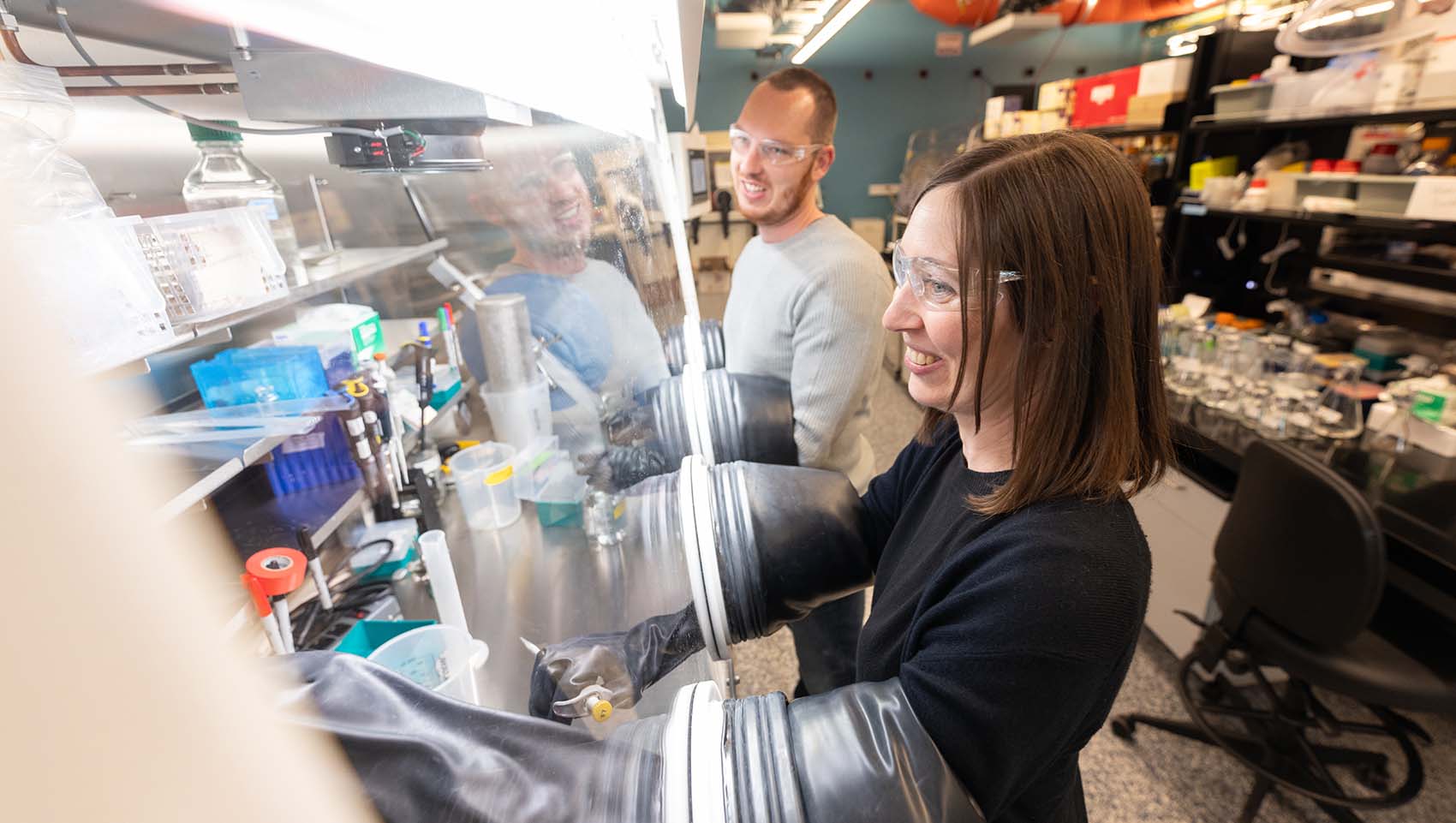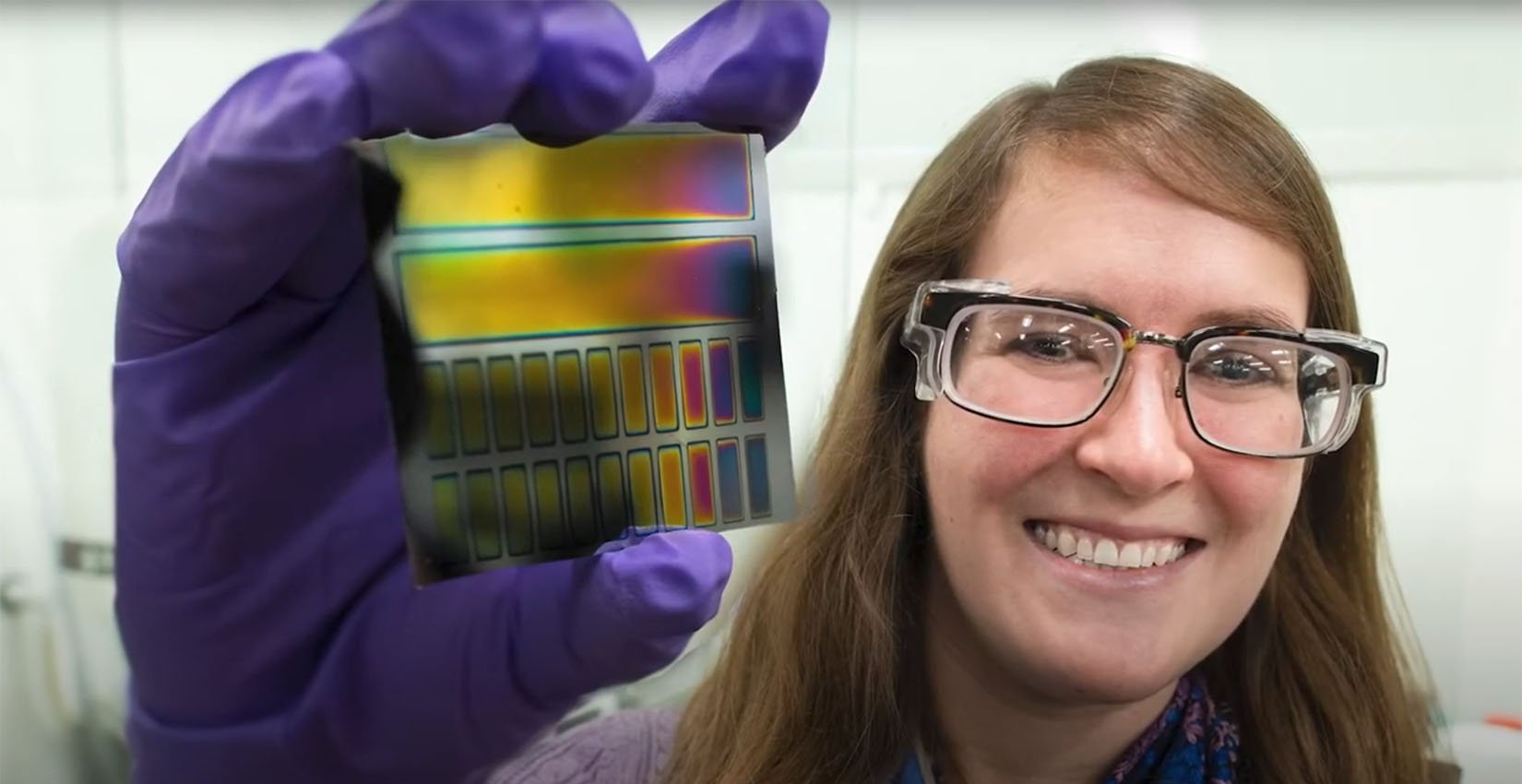Basic Energy Sciences
NLR's basic energy sciences programs aim to understand, predict, and ultimately control matter and energy at the electronic, atomic, and molecular levels.
Our research provides the foundations of new technologies for energy generation, conversion, transmission, storage, and use.

Funded by the U.S. Department of Energy (DOE) Office of Science, Basic Energy Sciences program, our research programs include core projects, Energy Frontier Research Centers, Energy Earthshot Research Centers, support for the Energy Innovation Hub Liquid Sunlight Alliance, and awards from DOE's Early Career Research Program.
NLR researchers develop foundations for energy solutions through core capabilities in semiconductors and materials science, nanomaterials synthesis and modification, synthesis and fabrication, photochemistry, electrochemistry, bioscience, theory, computation, and advanced spectroscopy.
These capabilities allow us to develop a better scientific understanding of photonic, electronic, atomic, molecular, nanoscale, semiconductor, and biological materials, systems, and processes.
Chemical Sciences, Geosciences, and Biosciences
NLR supports DOE's Basic Energy Sciences Chemical Sciences, Geosciences, and Biosciences Division through experimental, theoretical, and computational research to provide a fundamental understanding of chemical transformations and energy flow for the discovery of new chemical processes.
Solar photochemistry (Jeff Blackburn)
Photosynthetic energy transduction (Paul W. King)
Mechanism of photochemical nitrogen reduction (Paul W. King)
Questaal software suite: Hierarchical scalable Green's function modeling of chemistry at interfaces (Computational Chemical Sciences Center; Mark van Schilfgaarde)
Mechanistic determinants of flavin-based electron bifurcation (Early Career Award; Cara Lubner)
Cell-type specific pectins in plant cell walls (led by University of Georgia; Vivek Bharadwaj)
Beyond-density functional theory electrochemistry with accelerated and solvated techniques (Computational Chemical Sciences Center led by Rensselaer Polytechnic Institute; Derek Vigil Fowler).
Understanding interfacial phenomena for solar hydrogen production and nitrogen reduction (led by SLAC Accelerator National Laboratory; Todd Deutsch)
Materials Science and Engineering
NLR supports DOE's Basic Energy Sciences Materials Science and Engineering Division by fundamental experimental and theoretical research for the discovery and design of new materials with novel structures, functions, and properties.
Nitride materials and interfaces for radiation-hard integrated neutron detection (partially funded by the Advanced Scientific Computing Research program; Nancy Haegel)
Questaal software suite: Ab initio theory of unconventional superconductivity (Mark van Schilfgaarde)
Design, discovery, and chemical synthesis of earth abundant ferromagnetic nitrides (Sage Bauers)
Disorder in topological semimetals (Kirstin Alberi)
Kinetic synthesis of metastable nitrides (Early Career Award; Andriy Zakutayev)
Enabling durability in adsorbents for direct air capture (led by Lawrence Livermore National Laboratory; Wade Braunecker)
Formulation engineering of energy materials via multiscale learning spirals (led by Cornell University; David Moore)
Understanding interfacial phenomena for solar hydrogen production and nitrogen reduction (led by Dartmouth College; Sage Bauers)
Fundamental Studies of Hydrogen Arc Plasmas for High-Efficiency and Carbon-Free Steelmaking (Arizona State University-led; Hariswaran Sitaraman)
Researchers Discover New Way To Make 'Atomic Lasagna'
Researchers discovered a method to transform materials with three-dimensional atomic structures into nearly two-dimensional structures—a promising advancement in controlling their properties for chemical, quantum, and semiconducting applications.
Chemist Rebecca Smaha Knows It: Next-Gen Energy Technologies Hinge on Basic Materials Science
Read the Q&A with chemist Rebecca Smaha and her love of materials science.
Stronger Together: Coupling Excitons to Polaritons for Better Solar Cells and Higher Intensity LEDs
Researchers used transient absorption spectroscopy to demonstrate control of exciton/exciton annihilation,
which could help reduce energy dissipation and potentially increase efficiency in optoelectronic devices.
Innovative Materials and Scalable Manufacturing Pathways: New Research Center to Look Toward the Future of Renewable Energy
Center will enable expanded materials selection and integration for next-gen power electronics through novel interface and substrate design, coupled with pathways to scalable, low-cost, high-speed manufacturing.
Research Dives Deeper Into the Mysteries of Energy Control in Electron-Bifurcating Enzymes
Understanding the catalytic mechanism of this unusual class of enzymes may be a precursor to more efficient catalysis in the production of fuels and chemicals.
Understanding Bifurcating Enzymes Could Lead to More Efficient Renewable Fuel and Chemical Production
With support From DOE's Basic Energy Sciences program, researchers unravel the atomic-level mysteries of flavin-based electron bifurcation.
New Database Aims To Accelerate Electrocatalyst Development Through Atomic-Scale Insights
Systematic approach provides baseline understanding of electrocatalytic reactions necessary for production of valuable fuels and chemicals.
Materials Science Software Enables High-Fidelity Answers to Basic Principles Questions
NLR's Questaal software helps simplify computationally intensive processes by solving quantum physics equations efficiently and with high fidelity.
Energy Frontier Research Centers
DOE Energy Frontier Research Centers (EFRCs) is a basic research program funded by DOE's Office of Basic Energy Sciences that brings bring together creative, multidisciplinary, and multi-institutional teams of researchers to address the toughest scientific challenges at the forefront of fundamental energy science research.
These centers use powerful new tools for characterizing, understanding, modeling, and manipulating matter from atomic to macroscopic length scales. They also train the next-generation scientific workforce by attracting talented students and postdoctoral researchers interested in energy science.
NLR leads two and participates in six EFRCs:

NLR leads the Center for Hybrid Organic-Inorganic Semiconductors for Energy EFRC.
NLR EFRC Director: Matt Beard

NLR leads A Center for Power Electronics Materials and Manufacturing Explorations EFRC.
NLR EFRC Director: Nancy Haegel

NLR participates in the Bioinspired Light-Escalated Chemistry EFRC.
NLR Principal Investigator: Obadiah Reid

NLR participates in the Center for Alkaline-based Energy Solutions EFRC.
NLR Principal Investigator: Bryan Pivovar

NLR participates in the Center for Electrochemical Dynamics and Reactions on Surfaces EFRC.
NLR Principal Investigator: Bill McMahon

NLR participates in the Ensembles of Photosynthetic Nanoreactors EFRC.
NLR Principal Investigator: Katie Hurst

NLR participates in the Reconfigurable Electronic Materials Inspired by Nonlinear Neuron Dynamics EFRC.
NLR Principal Investigator: Andrew Ferguson

NLR participates in the Center for Soft PhotoElectroChemical Systems EFRC.
NLR Principal Investigator: Elisa Miller
Previously, NLR led the Center for Next Generation Materials Design and the Center for Inverse Design. NLR participated in these EFRCs:
Biological Electron Transfer and Catalysis
Center for Advanced Solar Photophysics
Center for Direct Catalytic Conversion of Biomass to Biofuels
Center for Interface Science: Solar Electric Materials
Fuels From Sunlight Energy Innovation Hub
DOE's Basic Energy Sciences program manages the Energy Innovation Hubs, which focus on collaborative fundamental science research with the intent to demonstrate and evaluate integrated energy systems.
NLR is part of the Liquid Sunlight Alliance (LiSA), a Fuels from Sunlight Energy Innovation Hub focused on research for generation of liquid fuels from sunlight, water, and nitrogen.

Contact
Share
Last Updated Jan. 27, 2026
